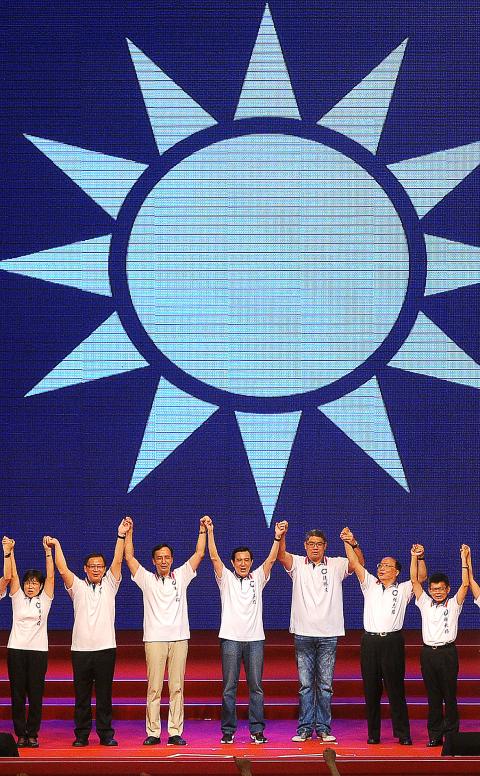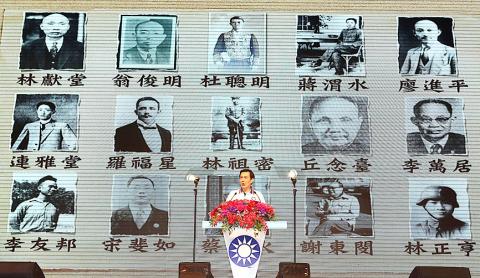President Ma Ying-jeou (馬英九), in his capacity as Chinese Nationalist Party (KMT) chairman, yesterday went on the offensive, aiming to boost support for the party in the Nov. 29 elections, charging that the Democratic Progressive Party (DPP) has hindered the nation’s progress.
In his speech at the KMT national congress held in Chiayi City, Ma accused the DPP of trampling on the democratic spirit of majority decisionmaking by occupying the podium at the Legislative Yuan 92 times over the past six years, preventing bipartisan dialogue and engaging in what he termed endless boycotts.
“This attitude of extreme conceit bent on excluding outsiders, humiliating officials and playing games with specific bills is the biggest crisis Taiwan currently faces,” Ma said.

Photo: Wang Min-wei, Taipei Times
Ma said the DPP used violent tactics that would not help solve any of the nation’s problems, adding that if the opposition party truly “loved Taiwan” as it said, it should cease actions that lead to infighting and wasting resources.
“Return to the true path of democracy and persuade the people with civilized conduct,” Ma said.
The public’s loyalty to the system far exceeds the interests of any political party, or concerns over an individual candidate’s success or failures at elections, Ma said, adding that such was the value of Taiwanese democracy and why the governments and people of the world have praised the nation for its peaceful transition of government.

Photo: CNA
Ma said that the DPP used “all sorts of reasons” to malign the rightful power of government accorded to the KMT by the Constitution and are attempting to bully the majority into submitting to the will of the few. Ma then accused the DPP of abusing its role as the opposition party.
Appealing to voters for support in the Nov. 29 elections, Ma said “The KMT is a party local to Taiwan, it is progressive and forward-looking, practical and responsible, and it is a diverse party that is willing to embrace changing times.”
Ma said that people spread across Taiwan, Penghu, Kinmen and Matsu might have come from different places and have different histories, but the acceptance of multicultural society is what makes Taiwan precious.
“The Aborigines may believe in ancestral spirits and rainbow bridges, the earlier Han immigrants remember the sadness inherent in their relocation to Taiwan, the people following the Nationalist government to Taiwan in 1949 remembered having to leave their homes and families behind, while the newer immigrants — such as foreign spouses — have the hope that over time this land will become their home,” Ma said, adding that “no matter who came first, no matter where we had come from, we are now all Taiwanese.”
“On this land, people of any culture and ethnicity are welcome to work side by side, to sweat and toil over the common goal of making Taiwan better; the embracing of multiple diverse cultures is the cornerstone of democracy,” he said.
“We are the most localized of all political parties,” Ma said, adding that “any supporter of the KMT would be able to walk tall and say: ‘I’m Taiwanese, I support the KMT.’”
In his speech, Ma also enumerated what the KMT has accomplished at the local, county and national levels.
The party’s members promoted competition capability for cities, encouraged the birth rate and introduced new vitality in business sectors through finding new investors, as well as increasing the number of jobs in cities where KMT members governed.
“We are telling the public by our actions and achievements that the KMT is better than the DPP at local government,” Ma said.
Additional reporting by CNA

NATIONAL SECURITY THREAT: An official said that Guan Guan’s comments had gone beyond the threshold of free speech, as she advocated for the destruction of the ROC China-born media influencer Guan Guan’s (關關) residency permit has been revoked for repeatedly posting pro-China content that threatens national security, the National Immigration Agency said yesterday. Guan Guan has said many controversial things in her videos posted to Douyin (抖音), including “the red flag will soon be painted all over Taiwan” and “Taiwan is an inseparable part of China,” while expressing hope for expedited “reunification.” The agency received multiple reports alleging that Guan Guan had advocated for armed reunification last year. After investigating, the agency last month issued a notice requiring her to appear and account for her actions. Guan Guan appeared as required,

A strong cold air mass is expected to arrive tonight, bringing a change in weather and a drop in temperature, the Central Weather Administration (CWA) said. The coldest time would be early on Thursday morning, with temperatures in some areas dipping as low as 8°C, it said. Daytime highs yesterday were 22°C to 24°C in northern and eastern Taiwan, and about 25°C to 28°C in the central and southern regions, it said. However, nighttime lows would dip to about 15°C to 16°C in central and northern Taiwan as well as the northeast, and 17°C to 19°C elsewhere, it said. Tropical Storm Nokaen, currently

‘NATO-PLUS’: ‘Our strategic partners in the Indo-Pacific are facing increasing aggression by the Chinese Communist Party,’ US Representative Rob Wittman said The US House of Representatives on Monday released its version of the Consolidated Appropriations Act, which includes US$1.15 billion to support security cooperation with Taiwan. The omnibus act, covering US$1.2 trillion of spending, allocates US$1 billion for the Taiwan Security Cooperation Initiative, as well as US$150 million for the replacement of defense articles and reimbursement of defense services provided to Taiwan. The fund allocations were based on the US National Defense Authorization Act for fiscal 2026 that was passed by the US Congress last month and authorized up to US$1 billion to the US Defense Security Cooperation Agency in support of the

PAPERS, PLEASE: The gang exploited the high value of the passports, selling them at inflated prices to Chinese buyers, who would treat them as ‘invisibility cloaks’ The Yilan District Court has handed four members of a syndicate prison terms ranging from one year and two months to two years and two months for their involvement in a scheme to purchase Taiwanese passports and resell them abroad at a massive markup. A Chinese human smuggling syndicate purchased Taiwanese passports through local criminal networks, exploiting the passports’ visa-free travel privileges to turn a profit of more than 20 times the original price, the court said. Such criminal organizations enable people to impersonate Taiwanese when entering and exiting Taiwan and other countries, undermining social order and the credibility of the nation’s